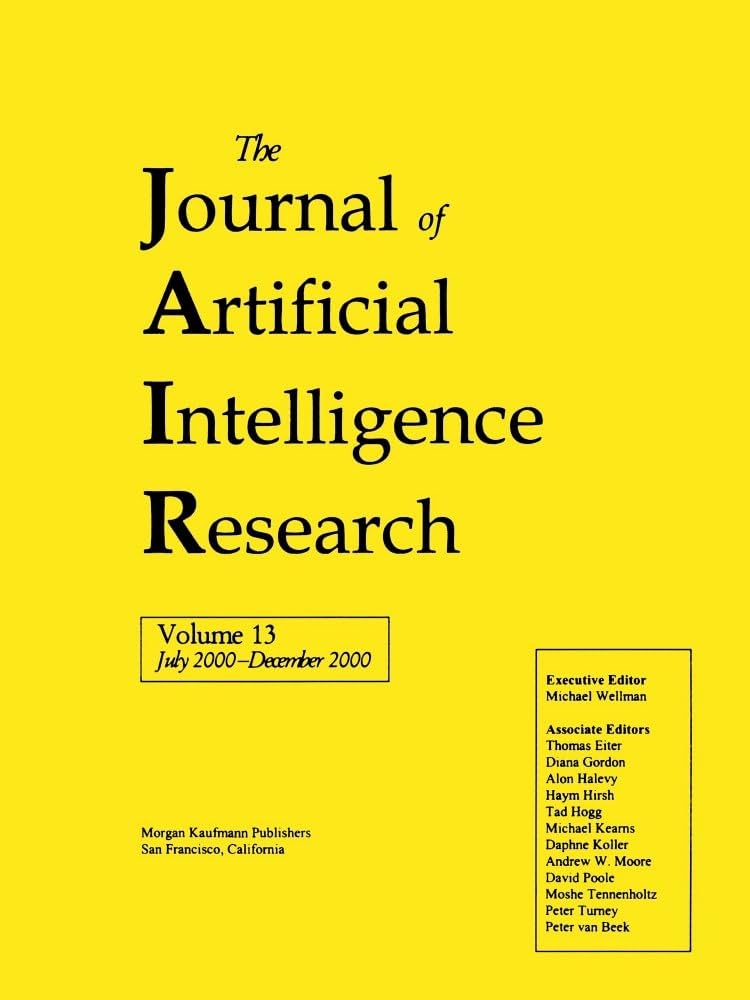On Fair Division under Heterogeneous Matroid Constraints
IF 4.5
3区 计算机科学
Q2 COMPUTER SCIENCE, ARTIFICIAL INTELLIGENCE
引用次数: 2
Abstract
We study fair allocation of indivisible goods among additive agents with feasibility constraints. In these settings, every agent is restricted to get a bundle among a specified set of feasible bundles. Such scenarios have been of great interest to the AI community due to their applicability to real-world problems. Following some impossibility results, we restrict attention to matroid feasibility constraints that capture natural scenarios, such as the allocation of shifts to medical doctors and the allocation of conference papers to referees. We focus on the common fairness notion of envy-freeness up to one good (EF1). Previous algorithms for finding EF1 allocations are either restricted to agents with identical feasibility constraints or allow free disposal of items. An open problem is the existence of EF1 complete allocations among agents who differ both in their valuations and in their feasibility constraints. In this work, we make progress on this problem by providing positive and negative results for several matroid and valuation types. Among other results, we devise polynomial-time algorithms for finding EF1 allocations in the following settings: (i) n agents with heterogeneous (non-identical) binary valuations and partition matroids with heterogeneous capacities; (ii) two agents with heterogeneous additive valuations and partition matroids with heterogeneous capacities; and (iii) three agents with heterogeneous binary valuations and identical base-orderable matroid constraints.非均匀矩阵约束下的公平除法
研究了具有可行性约束的添加剂之间不可分割商品的公平分配问题。在这些设置中,每个代理只能从一组指定的可行包中获得一个包。由于这些场景适用于现实世界的问题,因此引起了人工智能社区的极大兴趣。根据一些不可能的结果,我们将注意力限制在捕获自然情景的矩阵可行性约束上,例如医生轮班的分配和会议论文的分配给裁判。我们关注的是普遍的公平概念,即不嫉妒达到一个好(EF1)。以前用于寻找EF1分配的算法要么限制为具有相同可行性约束的代理,要么允许自由处置项目。一个悬而未决的问题是,在估值和可行性约束都不同的代理人之间存在EF1完全分配。在这项工作中,我们通过提供几种矩阵和估值类型的正负结果,在这个问题上取得了进展。在其他结果中,我们设计了多项式时间算法,用于在以下设置中寻找EF1分配:(i) n个具有异构(非相同)二进制估值的代理和具有异构容量的分区拟阵;(ii)两个具有异质相加估值的代理和具有异质容量的分区拟阵;(iii)三个具有异构二元估值和相同基序矩阵约束的代理。
本文章由计算机程序翻译,如有差异,请以英文原文为准。
求助全文
约1分钟内获得全文
求助全文
来源期刊

Journal of Artificial Intelligence Research
工程技术-计算机:人工智能
CiteScore
9.60
自引率
4.00%
发文量
98
审稿时长
4 months
期刊介绍:
JAIR(ISSN 1076 - 9757) covers all areas of artificial intelligence (AI), publishing refereed research articles, survey articles, and technical notes. Established in 1993 as one of the first electronic scientific journals, JAIR is indexed by INSPEC, Science Citation Index, and MathSciNet. JAIR reviews papers within approximately three months of submission and publishes accepted articles on the internet immediately upon receiving the final versions. JAIR articles are published for free distribution on the internet by the AI Access Foundation, and for purchase in bound volumes by AAAI Press.
 求助内容:
求助内容: 应助结果提醒方式:
应助结果提醒方式:


